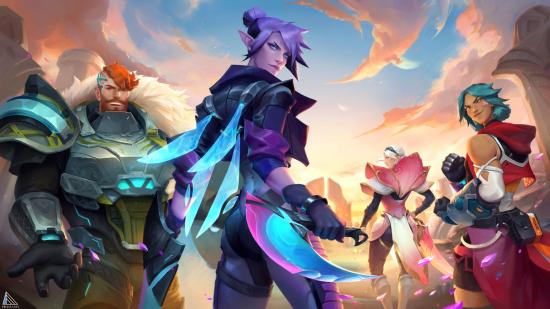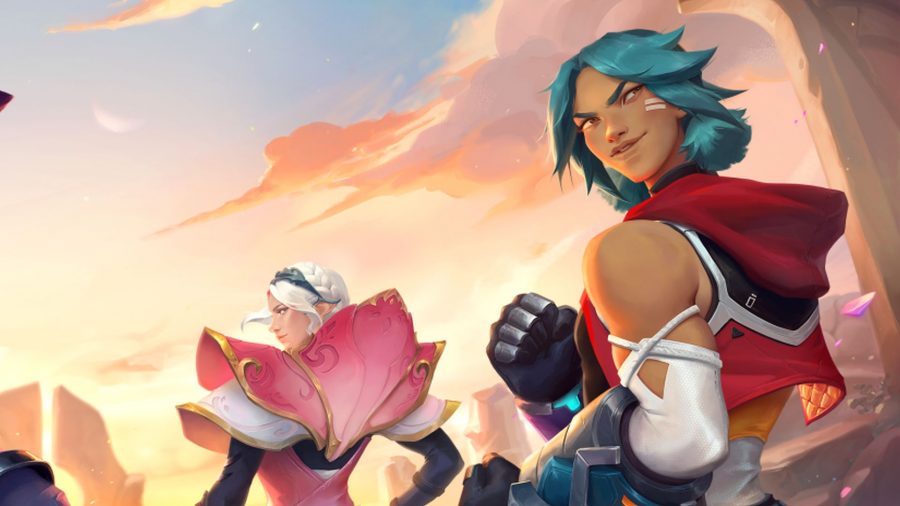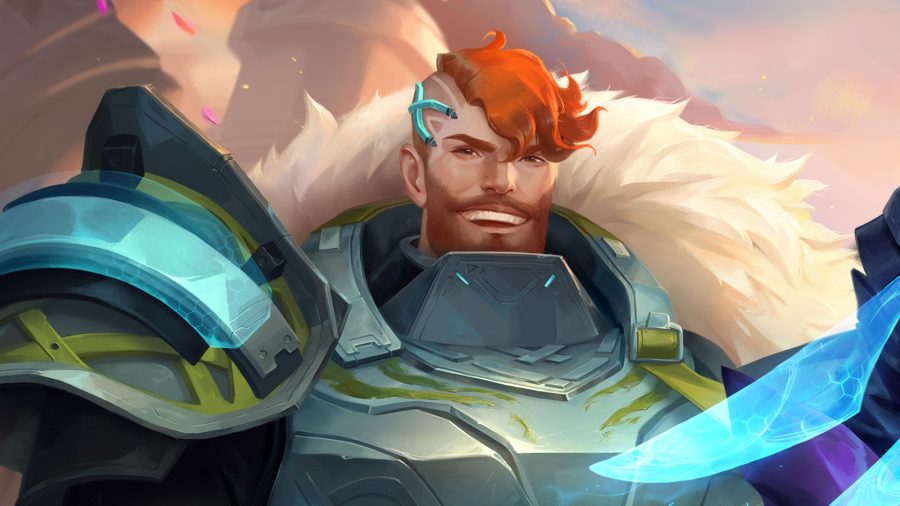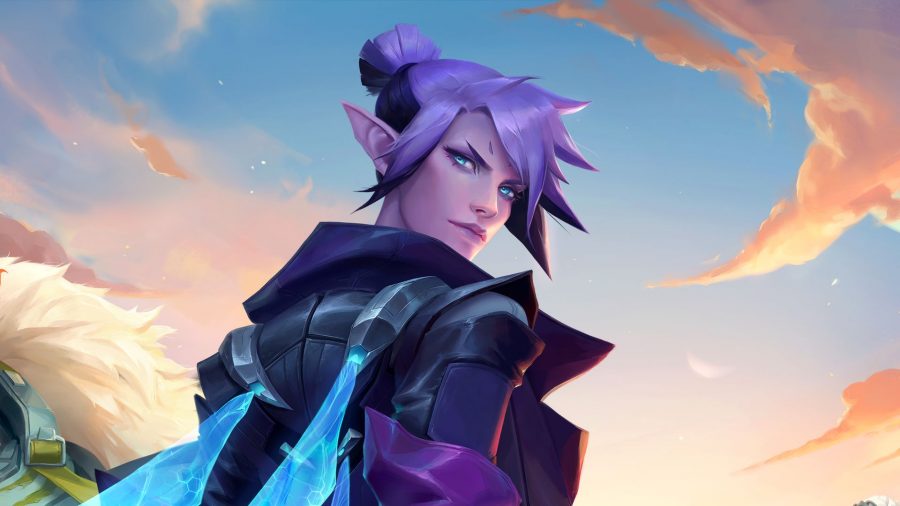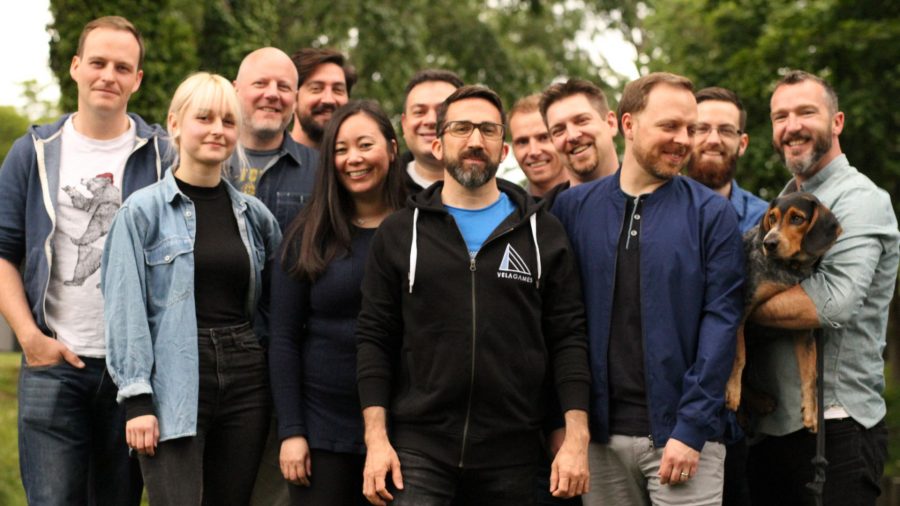Last week, new studio Vela Games announced beta sign-ups were open for its debut project. Codenamed Project-V, it’s touted as a ‘MOCO’ – that is, a multiplayer online co-op game. It’s part PvP, part PvE, with a sci-fi fantasy setting and an evolving narrative that’ll build over time.
That’s a very ambitious pitch for a studio’s first outing. A quick peek at the studio’s website shows little in the way of detail about the upcoming PC game just yet. Glimpses of early character art and a few morsels of information about its gameplay have given us a sample of its flavour. Vela Games conjures a mishmash of League of Legends and World of Warcraft, with “the teamplay and skill of a MOBA [and] the adventure of an MMO dungeon raid”. We speak with Vela Games’ CEO Travis George, a former product lead for Riot’s flagship MOBA game League of Legends, in a world-exclusive interview to find out more about Project-V.
Read on to find out how Vela Games aims to revolutionise online co-op gameplay, take a Hades-like approach to risk/reward design, and adopt some “mythical cyberpunk” elements.
PCGamesN: We understand you’re creating a “unique and revolutionary take on online co-op set in a science fantasy universe”. Can you tell us more about this?
George: For us, the gameplay and the setting go hand in hand. This is certainly not the case 100% of the time, but it seems like developers often make a very clear trade-off between building an interesting world – and that’s the predominant thing that the game hits on – or creating a hardcore PvP game where you’re here to rank up and kill people.
We thought ‘why can’t we do a little bit of both?’ Why can’t we make a skill-based game where the gameplay is about playing the game and improving, but set it in a world that has interesting characters, and the world evolves, and things are happening, and it matters?
I think ‘science fantasy’ is just the most accurate way we could talk about it, because we want to have a broad scope for interesting things to happen in the world. We want to have a wide range of different characters. We’ve got different races – it’s not set on Earth, it’s our own IP, but we’ll have some familiar gameplay and character personality tropes that look exciting, but offer some new takes.
We’ve released art for a few of our early characters, [but] there’s much more to go; there’s lots more in the world. You’ve got a fae character, which has an almost mythical cyberpunk look. It was just like, ‘Why doesn’t that work? That seems great’, and we all gravitated towards it. We’ve got a little bit more of the classic elf trope, kind of a mix of technology and sci-fi. It’s a challenge to get it all to work together and feel good, and then tie it together with the story, but we’ve spent a lot of time trying to get that right.
From a previous interview, I understand there’s no win/lose trade-off, similar to Hades. How will this be manifested in the game?
I think there’s a holistic approach with everything, right? Which is sometimes hard to boil down into one thing, but Hades is a great example of how you can narratively flip the context of a completely unforgiving genre (roguelikes/roguelites) and say, ‘Well, that was part of it’, you know? ‘That was expected’; no screen says: ‘You lose’.
Fun with friends: The best multiplayer games on PC
To Lisa’s point last year, what we’ve been looking at specifically is having things you [either] accomplish or don’t. There’s no way to take that out of games like the one we’re making. I think there are a lot of games that do this well, like Animal Crossing, but we’re making a game that’s about improving. You need to be able to measure yourself. You can do that through the narrative context, and you can do that from the gameplay itself, which is hard, but you feel yourself getting better, and you learn from that.
We’ve looked at roguelikes since the beginning as inspiration on how to do that, and how to frame winning or losing from a gameplay perspective. You also look at PvP games that say: ‘You won, you blew up the other person’s base, you killed everybody’, but how did you do? Was it really close? Was it a stomp? And there are so many good examples. I think that even though we’re making a game that strives to be less angsty and toxic in terms of the gameplay itself, how we frame that through the narrative [and] gameplay, hopefully, will make it feel like it’s part of the experience.
It’s part of that player growth – we are playing together, we see it, we feel better, we’re getting better, and not having to dumb it down. We don’t want to dumb it down. It’s not about going and making League of Legends but with really good bots, right?
The theme of accessibility pops up all over the place in your game, and you’ve previously said you’re looking to remove the barriers between players. Can you tell us what that entails?
One of those golden rules that we set out with from before we had much was ‘friends should never be a burden’. Specifically for us, it manifests in a couple of very important ways. So, making the game more about your skill, how you’re doing, and how you know a particular role. So we do have different roles in the game, we’ve got different styles of play, and we’ve got team-based comps. So, removing as many barriers for us means that players don’t need a level 1000 item to be able to even do the content they’re interested in.
That doesn’t mean there won’t be any progression in the game, but we’re thinking about it in different ways as opposed to vertical progression and horizontal progression. If you’ve been playing our game and really liking it for the last few months, or six months, or a year or whatever, we want you to be able to tell your friends and say, ‘Hey, just jump in this game’ and have a meaningful experience together. So that’s a big design decision that’s really important to us.
Battle away: The best MOBA games on PC
We know there are quite a few people who stopped playing League of Legends, for one reason or another. A lot of those times the negative player interactions do push people away in competitive games. Then there’s a lot of people who haven’t even ever tried a hardcore competitive game, because they don’t want to have that experience or the anxiety of not knowing the game and potentially having a negative experience in their first few games when they’re trying to learn.
We also think of accessibility in terms of the audience. How can we build something that satisfies that urge to be good and to master something, but also design a game that promotes better player and community interaction? And then people who wouldn’t have tried one game with a bad reputation over here because of the reputation maybe will try our game.

A lot of that is out of our hands to an extent; we’re not trying to solve human behaviour, right? But we do have a fundamental belief that the decisions you make about the game itself have a very clear correlation in terms of the player dynamics that exist in and around it.
Can you tell us about the back end you’re creating for matchmaking?
It’s not just the game design, it’s not just how we work with the community – there are all these other interaction points that players have in the total experience of playing a game. Matchmaking, I think, has been one of the best things and maybe one of the biggest double-edged swords of multiplayer gaming in the last decade.
We delayed League of Legends to put matchmaking in because the server browser experience in traditional online games was okay for what it was. Still, it took a long time, it was unreliable, and so we put that in. We saw for the first time on a large scale ‘I can press a button that says play, and I can be playing a game in two minutes that I generally think is going to be somewhat fair’. That was a big deal that we all take for granted now.
But I think it’s time to look beyond just a number. And I think there’s a tremendous amount of expertise that’s gone into skill-based matchmaking algorithms with very smart people. One of the things we think about though, is that those algorithms typically want to give you a win rate of 51%-55%. And so, it’s setting you up so that you can’t win a lot, right? I don’t know whether that’s good or bad, but that’s a fact.
What we really believe is we’re taking on back-end stuff such as matchmaking so that we can ask a lot of those questions and say, ‘Are there other factors besides skill that should go into matchmaking?’ We think there are. For example, ‘What type of players would you like to play with?’ Even something as simple as ‘are you here to play a normal game or a ranked game?’ In a competitive game I’m kind of like, ‘Um, well, I mean, I don’t want to be judged by the system’. But I want to go and try to get better and win.
When will you reveal more about the game to a broader audience?
In terms of the gameplay itself? We’re going to take that as it goes. So from what we talked a lot about today, I don’t think it’s super hard to imagine the space and hopefully what the experience is like now. We have a real game, and we play it every day – it’s a thing that exists. So a lot of the stuff that we’re talking about is based on what the game is, as opposed to what we hope, aspirationally, it might be. We’re not shy about sharing, but we also don’t want to say something and then two weeks later say ‘Ah, we changed that’. Then, hopefully, we will have a big announcement party at some point where we want to put the game out on more people’s radar.
I think the vision for the game is: what can a group of friends just play over and over, feel like we’re getting better at, for a long time, that we care about, and that makes us a little less angry? Or, has the right player dynamics that bring people in from other gaming communities, who might have been worried about a competitive space before, without trying to dumb it down? We all play those games because they’re great. Just, can we make it so that games are a little bit more fun? We all need a little bit more fun and a little bit less anxiety and stress in the things that are supposed to bring us joy.
Team work: The best co-op games on PC
To rattle off a few things that won’t change: the game’s multiplayer-only. We’ll talk about business models specifically later, but it’s very player focused; we’re not going to be in the business of selling advantages to players one way or another. Ultimately, we’re going to build something that players will love and feel like supporting us for. That’s our plan: give away more than maybe we should, and hopefully, it comes back to us. We have a lot of trust in the gaming community as a whole. We spent time talking about negative player dynamics, but so many times that’s not because people are bad, it’s because they’re having bad moments. And so we want to diminish that as much as we can.
There’s no sign of a Project-V release date as yet, but you can follow the studio’s progress on its website and Twitter at those links, as well as sign up to join the game’s playtesting community on the dev’s site. In the meantime, you can also take a peek at our rundown of the best new PC games out now for something else to try while you wait.
